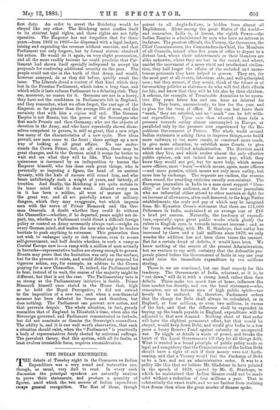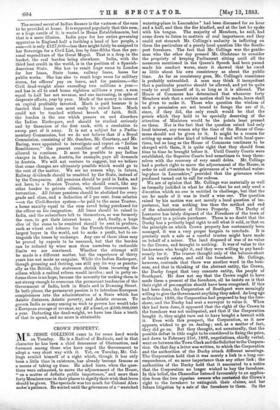THE INDIAN EXCHEQUER.
THE debate of Tuesday night in the Commons on Indian Expenditure was a very sound and instructive one, though, as usual, very dull to read. In every such discussion the principal speakers are naturally anxious to prove their statements, and produce a quantity of figures, amid which the two secrets of Indian expenditure escape general recognition. The first of these, though
patent to all Anglo-Indians, is hidden from almost all Englishmen. Alone among the great States of the world— and remember, India is, at lowest, the eighth Power—the Indian Empire is administered by men who have no interest in its future. The greatest officials, the Viceroy, the Governors, the Chief Commissioners, the Commanders-in-Chief, the Members of all Councils, intend after five years of office to depart to a distant land, where their achievements or their blunders are alike unknown, where they are lost in the crowd, and where, amidst the movement of a more vivid and intellectual civilisa- tion, they half forget the affairs of the secluded and mono- tonous peninsula they have helped to govern. They are, for the most part at all events, laborious, able, and well-principled men ; but they cannot, if they would, think of the future or of far-reaching policies as statesmen do who will feel their effects for life, and know that they will be felt also by their children. A scheme, for example, of Terminable Annuities to be opera- tive fifty years hence has and can have no interest for them. They learn, unconsciously, to live for the year, and to plan for the term of office. If they can but leave their "mark," they are satisfied, and no " mark " can be left with- out expenditure. Upon men thus situated there falls a pressure towards outlay almost unexampled in Europe, or paralleled only by the pressure now experienced by the Re- publican Government of France. The whole world around Indian statesmen is asking them to improve things,—to build more railways, to cut more canals, to construct more roads, to give more education, to establish more Courts, to give better and more civilised administration. The Services amid which they live, and which evolve almost the only effective public opinion, ask not indeed for more pay, which they know they would not get, but for more help, which means more officers, more "leave"—which means, again, more officers —and more pension, which means not only more outlay, but more loss by exchange. The requests are endless, the reasons often sound, the retarding criticism usually non-existent. The European journalists in India to a matt must support "liber- ality," or lose their audience, and the few native journalists who are influential either attend to other matters or fight for an increase of allowances, often well deserved, to the huge Native establishments, the scale and pay of which may be imagined from Mr. Kynaston Cross's statement that there are 151,000 Policemen in India, maintained at an average cost of £16 a head per annum. Naturally, the tendency of expendi- ture, especially upon great public works which glorify the rulers in English eyes, is towards incessant increase ; and, so far from wondering, with Mr. E. Stanhope, that outlay has increased by three and a half millions since 1879, we only wonder the addition has not been three times the amount. But for a certain dread of deficits, it would have been. We know nothing of the secrets of the present Administration, but we venture to say with certainty that the defensible pro- posals placed before the Government of India in any one year would raise the immediate expenditure by ten millions sterling.
There is, we are convinced, but one final remedy for this tendency. The Government of India, reluctant, as it is, to "cut down," will do it with a strong hand, rather than face deficits. Those make too much fuss at home, influence the loan market too directly, and vex the local statesmen—who, remember, are at bottom men of high public spirit—too keenly to be endured. If, therefore, Parliament orders that the charge for Debt shall always be calculated, as in England, at four millions, or even two millions, in excess of the fact, and that the difference shall be expended in buying up the bonds payable in England, expenditure will be adjusted to that new demand. Nothing short of that order will have the slightest permanent effect, but that would be obeyed, would keep down Debt, and would give India in a few years a heavy Reserve Fund against calamity or unexpected war. To niggle at details is waste of power, and breaks the heart of the Local Governments till they let all things drift. What is wanted is a broad principle of public policy made so legal and compulsory that the Commissioners of the Indian Debt should have a right of suit if their money were not forth- coming, and that a Viceroy would feel the discharge of Debt to be a law, and not an administrative order. It was to a policy like this that we believe Mr. Gladstone to have pointed in the speech of 1879, quoted by Mr. E. Stanhope, in which he maintained that Indian finance could not be made solid without a reduction of four millions a year. That is substantially the exact truth, and we are farther from realising that dream than when the great master of finance spoke. The second secret of Indian finance is the vastness of the sum to be provided at home. It is supposed popularly that this sum, or a huge cantle of it, is wasted in Home Establishments, but that is a mere illusion. India pays for her entire governing apparatus in England half a farthing a head of her people, a sum—it is only f127,000—less than might fairly be assigned to her Sovereign for a Civil List, less by four-fifths than the per- sonal expenditure of the Great MoguL That is a drop in the bucket, the real burden being elsewhere. India, with the third best credit in the world, is in the position of a Spanish- American State. She has to remit huge sums to London for her loans, State loans, railway loans, loans for public works. She has also to remit huge sums for military stores, for officers' pay on leave, and for pensions,—the Civil dead-weight alone exceeding two millions a year— and has in all to send home eighteen millions a year, a sum equal to half her net revenue, and one increasing, in spits of desperate efforts, year by year. Much of the money is interest on capital profitably invested. Much is paid because it is fancied that loans can most easily be raised here. Much could not be touched without breach of faith. Still, the burden is the one which presses on and disorders the Indian Exchequer, and should be studied seriously and by financiers of the first rank, with a resolution to sweep part of it away. It is not a subject for a Parlia- mentary Commission, but we do not believe that if a Royal Commission, consisting of Mr. Goschen, Mr. Courtney, and Mr. Baring, were appointed to investigate and report on "Indian Remittances," the present condition of affairs would be allowed to continue. It must be possible to pay Indian charges in India, as Austria, for example, pays all demands in Austria. We will not venture to suggest, but we believe that some changes are ultimately possible which would go to the root of the matter. We see no reason why, in future, Railway dividends should be remitted by the State, instead of by the Companies. All pensions should be paid in India, and not here, to a Pension Trustee, who should remit, like any other banker to private clients, without Government in- tervention. All future pensions should be abolished for every grade and class, and a deduction of 5 per cent, from salaries —on the Civil-Service system—be paid to the same Trustee, a home annuity equal to the sum saved being purchased for the officer on his resignation. All loans should be raised in India, and the subscribers left to themselves, as was formerly the case, to get their interest home. And, finally, a huge slice of the sums to be remitted should be sent in produce, such as wheat and tobacco for the French Government, the largest buyer in the world, not to make a profit, but to ex- tinguish the losses by exchange. Any one of these ideas may be proved by experts to be unsound, but that the burden can be reduced by wiser men than ourselves to endurable limits we are convinced. Whether the attempt will be made is a different matter, but the experience of thirty years has not made us sanguine. While the Indian Exchequer, though groaning and fretting, can still pay its way as punctu- ally as the British, the statesmen shrink from incurring the odium which a radical reform would involve ; and in petty re- forms there is no hope, because the necessity for making them is not strong enough to overcome the permanent tendencies of the Government of India, both in Simla and in Downing Street. In both places, the permanent passion is to introduce European completeness into the administration of a State which has Asiatic distances, Asiatic poverty, and Asiatic revenue. To govern India as many among us wish to govern her would take a European average of revenue, say .22 a head, or .2500,000,000 a year. Deducting the dead-weight, we have less than a tenth of that to spend, and no more is obtainable.



































 Previous page
Previous page